| Listing 1 - 10 of 10 |
Sort by
|
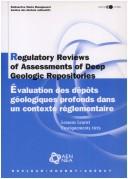
ISBN: 9264058869 9786610033805 1280033800 9264082182 Year: 2000 Publisher: Paris OCDE
Abstract | Keywords | Export | Availability | Bookmark
 Loading...
Loading...Choose an application
- Reference Manager
- EndNote
- RefWorks (Direct export to RefWorks)
Integrated performance assessments (IPAs) of radioactive waste repositories deep underground are made at different stages of repository development in order, for example, to allow full-scale development, to provide feedback to R&D, and to test and develop review capability. IPA studies must be acceptable to a wide range of stakeholders and are one of the bases for dialogue amongst regulators and implementers of disposal facilities. The goal of the IPAG-2 study was to examine the experience of regulatory reviews of IPAs, from both the implementer and regulator points of view. Ten implementer and seven regulatory organisations participated. This report presents the lessons learnt from their review experiences, and provides recommendations to aid future regulatory decision making.
Radioactive waste disposal in the ground --- Radioactive waste sites --- Dumping sites, Radioactive --- Radioactive dumping sites --- Radioactive waste disposal sites --- Radioactive waste facilities --- Hazardous waste sites --- Risk assessment --- Risk assessment. --- Geological repositories --- Radioactive waste repositories --- Nuclear waste repositories --- Deep geologic repositories --- Deep geologic disposal --- Radioactive waste sites. --- Radioactive waste repositories. --- Geological repositories. --- Geology --- Radioactivity
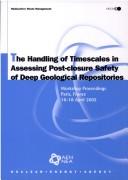
ISBN: 1280033908 9786610033904 9264099123 9789264099128 9264099115 Year: 2002 Publisher: Paris : OECD Publishing,
Abstract | Keywords | Export | Availability | Bookmark
 Loading...
Loading...Choose an application
- Reference Manager
- EndNote
- RefWorks (Direct export to RefWorks)
This book presents the proceedings of a workshop entitled the "Handling of Timescales in Assessing Post-Closure Safety" of deep geological repositories for radioactive waste organised in Paris on 16-18 April 2002 and hosted by the French Institute for Radiological Protection and Nuclear Safety (IRSN). The main objective of the workshop was to identify and discuss approaches related to, and work done on, the timescales issue within national radioactive waste management programmes in the context of assessing post-closure safety. The timescales in question depend upon the half-lives and levels of activity of the radionuclides considered for disposal. These proceedings include the presentations made at the workshop as well as a summary of the discussions held.
Radioactive waste disposal in the ground -- Congresses. --- Radioactive waste disposal in the ground --- Radioactive waste repositories --- Geologie repositories --- Environmental Engineering --- Civil & Environmental Engineering --- Engineering & Applied Sciences --- Nuclear waste repositories --- Geological repositories --- Radioactive waste sites --- France --- Déchets radioactifs --- Congresses --- Elimination dans le sol --- Congrès
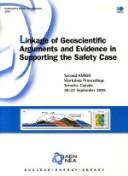
ISBN: 1281746355 9786611746353 9264021744 9264019669 9789264019669 Year: 2007 Publisher: Paris : NEA/OECD,
Abstract | Keywords | Export | Availability | Bookmark
 Loading...
Loading...Choose an application
- Reference Manager
- EndNote
- RefWorks (Direct export to RefWorks)
The long-term safety of deep disposal of radioactive waste is strongly dependent on the performance of the geological setting. The geology fulfils important safety functions including isolating the waste from human contact or intrusion, providing a stable physical and chemical environment, insulating against external disturbances, and preventing or delaying the transport of radioactive materials away from the waste. Thus, a sound understanding of the geology's history and evolution is central in supporting assessments that examine the long-term performance and safety of deep disposal. This conference proceedings examines how geoscientific arguments and data are compiled and linked to create a unified description of the geological setting to support a safety case. It also examines practical aspects and limitations in collecting, linking, extrapolating and communicating such information.
Radioactive waste disposal in the ground. --- Radioactive waste disposal in the ground --- Radioactive waste repositories --- Civil & Environmental Engineering --- Environmental Engineering --- Engineering & Applied Sciences --- Nuclear waste repositories --- Geological repositories --- Radioactive waste sites --- Canada --- Déchets radioactifs --- Dépôts de déchets radioactifs --- Congresses. --- Elimination dans le sol --- Congrès
Book
ISBN: 9789264274150 Year: 2017 Publisher: Paris : OECD Publishing,
Abstract | Keywords | Export | Availability | Bookmark
 Loading...
Loading...Choose an application
- Reference Manager
- EndNote
- RefWorks (Direct export to RefWorks)
Radioactive waste repositories. --- Radioactive waste disposal in the ground. --- Burial of radioactive wastes --- Ground radioactive waste disposal --- Underground radioactive waste disposal --- Hazardous waste sites --- Waste disposal in the ground --- Radioactive waste repositories --- Nuclear waste repositories --- Geological repositories --- Radioactive waste sites --- Radioactive waste disposal in the ground
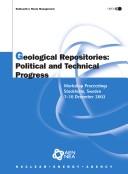
ISBN: 1281754382 9786611754389 9264008314 9789264008311 9264008306 Year: 2005 Publisher: Paris, France : Nuclear Energy Agency, Organisation for Economic Co-operation and Development,
Abstract | Keywords | Export | Availability | Bookmark
 Loading...
Loading...Choose an application
- Reference Manager
- EndNote
- RefWorks (Direct export to RefWorks)
This conference proceedings brings together the latest knowledge on political and technical progress in geological repositories for radioactive waste. It presents perspectives from a variety of countries and stakeholders, examines international instruments being used to facilitate the implementation of geological repositories, and assesses scientific progress and pending technical issues.
Disposicio ́n de residuos radiactivos -- Congresos. --- Disposicio ́n de residuos radiactivos en la tierra -- Congresos. --- Radioactive waste disposal in the ground -- Congresses. --- Radioactive waste repositories -- Congresses. --- Radioactive waste repositories --- Radioactive waste disposal in the ground --- Civil & Environmental Engineering --- Environmental Engineering --- Engineering & Applied Sciences --- Nuclear waste repositories --- Geological repositories --- Radioactive waste sites --- Sweden --- Dépôts de déchets radioactifs --- Déchets radioactifs --- Congresses. --- Congrès --- Elimination dans le sol

ISBN: 1280034459 9786610034451 9264193537 9264187227 Year: 2001 Publisher: Paris : OECD Publishing,
Abstract | Keywords | Export | Availability | Bookmark
 Loading...
Loading...Choose an application
- Reference Manager
- EndNote
- RefWorks (Direct export to RefWorks)
Analysis of the long-term safety of radioactive waste repositories, using performance assessment and other tools, is required prior to implementation. The initial stage in developing a repository safety assessment is the identification of all factors that may be relevant to the long-term safety of the repository and their combination to form scenarios. This must be done in a systematic and transparent way in order to assure the regulatory authorities that nothing important has been forgotten. This report is a review of developments in scenario methodologies based on a large body of practical experience in safety assessments. It will be of interest to radioactive waste management experts as well as to other specialists involved in the development of scenario methodologies.
Radioactive waste disposal in the ground -- Risk assessment -- Congresses. --- Radioactive waste disposal in the ground -- Risk assessment. --- Radioactive waste disposal in the ground. --- Radioactive waste repositories -- Congresses. --- Radioactive waste repositories. --- Radioactive waste disposal in the ground --- Radioactive waste repositories --- Environmental Engineering --- Civil & Environmental Engineering --- Engineering & Applied Sciences --- Risk assessment --- Nuclear waste repositories --- Burial of radioactive wastes --- Ground radioactive waste disposal --- Underground radioactive waste disposal --- Geological repositories --- Radioactive waste sites --- Hazardous waste sites --- Waste disposal in the ground --- Radioactive Safety --- Déchets radioactifs --- Dépôts de déchets radioactifs --- Congresses --- Elimination dans le sol --- Evaluation du risque --- Congrès
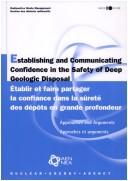
ISBN: 9264097821 9786610033874 1280033878 9264094458 Year: 2002 Publisher: Paris : OECD Publishing,
Abstract | Keywords | Export | Availability | Bookmark
 Loading...
Loading...Choose an application
- Reference Manager
- EndNote
- RefWorks (Direct export to RefWorks)
Confidence among both technical experts and the public in the safety of deep geologic repositories for radioactive waste is a key element in the successful development of the repositories. This report presents the approaches and arguments that are currently used in OECD countries to establish and communicate confidence in their safety. It evaluates the state of the art for obtaining, presenting and demonstrating confidence in long-term safety, and makes recommendations on future directions and initiatives to be taken for improving confidence.
Afval --- Kernenergie --- Stralingen --- Déchets --- Energie nucléaire --- Radiations --- Radioactive waste disposal in the ground --- Radioactive waste sites. --- Déchets radioactifs --- Dépôts de déchets radioactifs --- Risk assessment --- Elimination dans le sol --- Evaluation du risque --- Deep geologie disposal --- Radioactive waste repositories --- Radioactive waste sites --- Dumping sites, Radioactive --- Radioactive dumping sites --- Radioactive waste disposal sites --- Radioactive waste facilities --- Hazardous waste sites --- Nuclear waste repositories --- Geological repositories --- Monograph --- E-books --- Radioactive waste repositories. --- Deep geologie disposal. --- Risk assessment. --- Deep geologic disposal. --- Deep geologic waste disposal --- Deep geological disposal --- Hazardous wastes --- Waste disposal in the ground
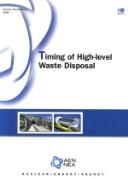
ISBN: 1281720003 9786611720001 9264046267 9264046259 Year: 2008 Publisher: Paris : Nuclear Energy Agency, Organisation for Economic Co-operation and Development,
Abstract | Keywords | Export | Availability | Bookmark
 Loading...
Loading...Choose an application
- Reference Manager
- EndNote
- RefWorks (Direct export to RefWorks)
This study identifies key factors influencing the timing of high-level waste (HLW) disposal and examines how social acceptability, technical soundness, environmental responsibility and economic feasibility impact on national strategies for HLW management and disposal. Based on case study analyses, it also presents the strategic approaches adopted in a number of national policies to address public concerns and civil society requirements regarding long-term stewardship of high-level radioactive waste. The findings and conclusions of the study confirm the importance of informing all stakeholders and involving them in the decision-making process in order to implement HLW disposal strategies successfully.
Deep geologic disposal. --- Radioactive waste disposal. --- Radioactive waste repositories. --- Radioactive waste disposal --- Deep geologic disposal --- Radioactive waste repositories --- Civil & Environmental Engineering --- Engineering & Applied Sciences --- Environmental Engineering --- Government policy --- Government policy. --- Nuclear waste repositories --- Deep geologic waste disposal --- Deep geological disposal --- Nuclear waste disposal --- Geological repositories --- Radioactive waste sites --- Radioactive waste disposal in the ground --- Hazardous wastes --- Waste disposal in the ground --- Nuclear engineering --- Radioactivity --- Refuse and refuse disposal --- Radioactive pollution --- Safety measures --- Belgium --- Canada --- Czech Republic --- European Union --- France --- Germany --- Japan --- Korea, Republic of --- Sweden --- United States

ISBN: 9264161546 9786610034024 1280034025 9264172025 Year: 1999 Publisher: Paris : OECD Publishing,
Abstract | Keywords | Export | Availability | Bookmark
 Loading...
Loading...Choose an application
- Reference Manager
- EndNote
- RefWorks (Direct export to RefWorks)
Low-level radioactive waste (LLW) arises in the normal operation of nuclear power plants and fuel cycle facilities, as well as from the use of radioactive isotopes in medicine, industry and agriculture. This report sets out the costs of operating disposal sites for LLW in OECD countries, as well as the factors that may affect the costs of sites being developed. This publication will be of special interest to experts in the field of radioactive waste management and economics of the nuclear fuel cycle.
Radioactive waste sites. --- Radioactive waste disposal. --- Low level radioactive waste disposal facilities --- Dépôts de déchets radioactifs --- Déchets radioactifs --- Nuclear Energy --- Radioactive waste sites --- Radioactive waste disposal --- Radioactive waste repositories --- Civil & Environmental Engineering --- Engineering & Applied Sciences --- Environmental Engineering --- Costs --- Nuclear waste repositories --- Geological repositories --- Radioactive waste disposal in the ground --- Nuclear waste disposal --- Nuclear engineering --- Radioactivity --- Refuse and refuse disposal --- Radioactive pollution --- Dumping sites, Radioactive --- Radioactive dumping sites --- Radioactive waste disposal sites --- Radioactive waste facilities --- Hazardous waste sites --- LLRW disposal facilities --- LLRW disposal sites --- LLRW facilities --- LLRW storage facilities --- Low level radioactive waste disposal sites --- Low level radioactive waste facilities --- Low level radioactive waste storage facilities --- Safety measures
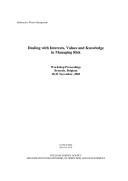
ISBN: 9264007318 9786610171453 1280171456 9264007326 9789264007321 Year: 2004 Publisher: Paris : Nuclear Energy Agency, Organisation for Economic Co-operation and Development,
Abstract | Keywords | Export | Availability | Bookmark
 Loading...
Loading...Choose an application
- Reference Manager
- EndNote
- RefWorks (Direct export to RefWorks)
Radioactive waste management is an area of public interest in which stakeholder involvement has largely proven itself to be beneficial to all parties and processes concerned. With growing experience, sharing best practice can be useful at the international level. These workshop proceedings deal with the local partnership methodology employed in Belgium in order to develop an integrated proposal to the national Government to construct and operate a disposal facility for low-level radioactive waste that is adapted to local conditions. The partnerships are formed amongst representatives of local organisations in affected communities and representatives of the Belgian National Radioactive Waste Management Agency.
Nuclear energy --- Environmental protection. Environmental technology --- Monograph --- RADIOACTIVE WASTE MANAGEMENT --- Radioactive waste disposal in the ground --- Radioactive waste repositories --- Low level radioactive waste disposal facilities --- Risk assessment --- LLRW disposal facilities --- LLRW disposal sites --- LLRW facilities --- LLRW storage facilities --- Low level radioactive waste disposal sites --- Low level radioactive waste facilities --- Low level radioactive waste storage facilities --- Radioactive waste sites --- Nuclear waste repositories --- Geological repositories --- Burial of radioactive wastes --- Ground radioactive waste disposal --- Underground radioactive waste disposal --- Hazardous waste sites --- Waste disposal in the ground --- Belgium
| Listing 1 - 10 of 10 |
Sort by
|

 Search
Search Feedback
Feedback About UniCat
About UniCat  Help
Help News
News